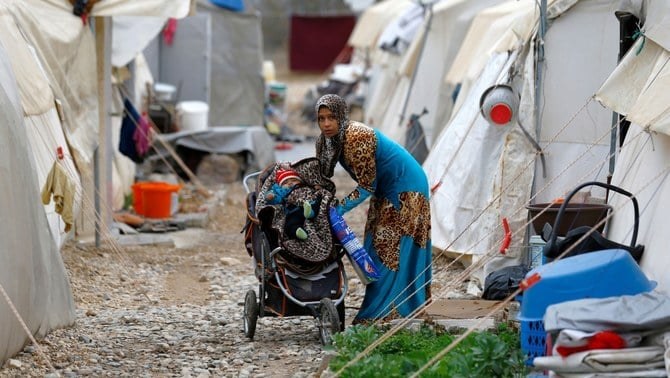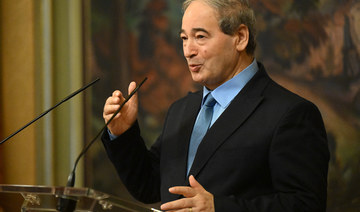ANKARA: Turkiye’s far-right, anti-refugee Victory (Zafer) Party has launched a fundraising campaign with the pledge that the money raised will be used to pay for one-way bus tickets to send all Syrian refugees home.
In a campaign video, the party asked supporters for the names of people they want to be sent back to Syria. It said it will buy tickets not only for the refugees but for those who support refugee rights in Turkiye.
“Ticket sales for Zafer Tourism’s one-way trips to Damascus have just begun,” the party’s founder, Umit Ozdag, said in a message posted on Twitter as he asked supporters to respond with the names of Syrians they wanted to make “early reservations” for.
The Victory Party has previously pledged to deport all Syrian refugees within a year if it gains power. But with its latest campaign, Ozdag is also targeting Turkish citizens who have adopted a pro-refugee stance, including journalist Nagehan Alci, by adding their names to a “persona non grata” list.
Syrian-Turkish journalist Ahmet Hamo was also targeted by the campaign, which featured a bus ticket with his name on it. Ozdag previously vowed to strip Hamo of his citizenship if Zafer takes power.
According to the UN, Turkiye hosts about 3.6 million Syrians displaced by the long-running civil war in their home country. The Victory Party was founded primarily on an anti-refugee platform and Ozdag often visits Syrian-run businesses telling them to leave the country as soon as possible. It recently published a video on YouTube, called Silent Invasion, to warn people about a supposed dystopian future for Turkiye in which Arabs outnumber Turks.
Ruhat Sena Aksener, the acting director of Amnesty International Turkiye, said many of the refugees and asylum seekers in Turkish camps live in constant fear of being sent back to the war-torn country they fled.
“Such discriminatory statements raised in public add to the fear of them being sent back, being discriminated against, and being exposed to racist threats and acts,” she told Arab News.
“The increase in physical attacks against refugees and immigrants with the rise of anti-refugee rhetoric is the clearest indicator of this.”
With presidential and parliamentary elections scheduled for May in Turkiye, all political parties are taking positions on the refugee issue. According to the latest Turkiye Trends 2022 survey, conducted by Global Akademi, it is the third most important issue among Turkish citizens, behind the economy and terrorism.
Turkiye’s main opposition Republican People’s Party, also known as the CHP, has also committed to sending refugees back to Syria if it assumes power. CHP leader Kemal Kilicdaroglu said this would be done in a voluntary and dignified way, as required by the principles of international law, and that security guarantees about the safety of returnees be sought from the Syrian regime.
The ruling Justice and Development Party also supports the return of Syrian refugees to Turkish-controlled areas in northern Syria, as part of a process of political normalization with the regime of President Bashar Assad, and Turkish authorities have already deported thousands. The Defense Ministry recently said the return of refugees will be in accordance with UN principles of safe repatriation.
According to Begum Basdas, a human rights and migration researcher at the Center for Fundamental Rights at Hertie School in Berlin, the forcible return of refugees to Syria violates the non-refoulement principle of international law codified in the 1951 Refugee Convention, which means Turkiye cannot send anyone to a place they might face violations of their human rights.
“Furthermore, the Turkish legal framework on temporary protection of Syrians also includes articles that prohibit refoulement,” she told Arab News.
“That said, in recent years most political leaders have chosen to ignore the rule of law to get the upper hand in upcoming elections.”
Aksener agrees with this assessment and said: “According to international law, under the non-refoulement principle, it is forbidden for asylum seekers to be sent to countries where they face the possible danger of persecution based on race, religion, nationality, belonging to a particular social group or political opinion.”
Therefore any political campaign that promises or promotes such a plan breaches international law, she added.
“Such actions should be perceived as attempts to discriminate against refugees by increasing racism and xenophobia, and are considered acts against human rights. That’s unacceptable,” Aksener said.
Victory Party founder Ozdag recently said there are 13 million refugees in Türkiye without providing any data or proof to support of his claim, compared with the UN figure of about 3.6 million. Basdas said Ozdag’s figure is deliberately unrealistic, designed only to fuel xenophobia and fear among the Turkish public.
“This latest campaign of the Victory Party is against international law, and it also aims to target individuals and normalize any violent act against them,” she said.
“Racism and discrimination perpetrated by the Victory Party, branded as ‘love of the country,’ is actually a recipe for a future shaped by hatred, distrust and violence, not only toward migrants but to all citizens that stand by human rights and the rule of law in a country that has been in a steady democratic decay.”
In recent years, Basdas said, putting people’s lives at risk has become a political tool used to win elections by distracting voters from the real problems that lie elsewhere. The few people who take a stand against such tactics are targeted in an attempt to silence them. She also criticized European nations for failing to meet their obligations on the issue.
“Europe fails to address the lack of effective access to asylum, violations of the principle of non-refoulement, and the discriminatory attacks against refugees, as well as the pushbacks at the borders by designating Turkiye as a safe third country. This must change now,” she said.
Western countries have often praised Turkiye’s remarkable efforts in hosting Syrian refugees. However, experts have said that the West should assume more responsibility relating to this issue.
“States must fulfill their obligations to protect people in need of international protection, to respect their human rights, and to ensure that they remain in their territory in favorable conditions until a permanent solution is found. Policies should advocate ending (border) pushbacks,” Aksener said.
Basdas agrees and said: “The international community should increase resettlement commitments for Syrians from Turkiye and offer sustainable solutions to provide assistance to host this large population in safety.”
About 223,881 Syrians have Turkish citizenship and 126,786 of them are eligible to vote in the upcoming elections.
Far-right Turkish party raising funds to buy bus tickets to send Syrian refugees home
Short Url
https://arab.news/9ukzn
Far-right Turkish party raising funds to buy bus tickets to send Syrian refugees home

- The Victory Party called for donations and said the money will pay for tickets to Syria not only for refugees but also those who support refugee rights
- Human rights experts said the party’s campaign is ‘against international law and it also aims to target individuals and normalize any violent act against them’













